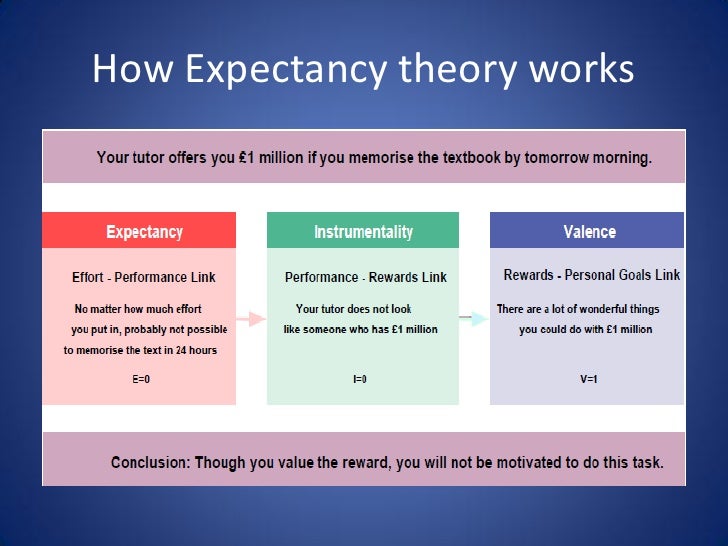Additional Physical Format: Online version: Vroom, Victor Harold, 1932-Work and motivation. New York, Wiley 1964 (OCoLC)648584316: Document Type: Book. NATURE AND CHARACTERISTICS OF THE EXPECTANCY THEORY The Expectancy Theory of motivation as developed by Victor Vroom is a process theory of motivation and it finds an important place in the literature of motivational theories. The Expectancy Theory looks at motivation in a more comprehensive and realisticthan some of the other theories.
Dorothy Williams | April 18, 2017 10:37 pm MST
While working in Corproate Training for over 13 years, (trained approx. 1000 employees) as a Training Instructor where the employees were our students, I learned about strong leadershp styles. Our leadership style encouraged, 'People First.' We trained front-line employees, supervisors, middle managers, and upper management on becoming a good (healthy) leader. Those approaches used in your article on the Expectancy Theory (goals, needs, and experiences), included in our training programs work: 'appreciation, recognition, inspiration, compensation, a healthy manager-employee relationship.' Our motto, 'Walk in Their Shoes,' ensured us that the trainers maintained a (healthy) employee training style.
- Log in to post comments
The expectancy theory was proposed by Victor Vroom of Yale School of Management in 1964. Vroom stresses and focuses on outcomes, and not on needs unlike Maslow and Herzberg. The theory states that the intensity of a tendency to perform in a particular manner is dependent on the intensity of an expectation that the performance will be followed by a definite outcome and on the appeal of the outcome to the individual.
The Expectancy theory states that employee's motivation is an outcome of how much an individual wants a reward (Valence), the assessment that the likelihood that the effort will lead to expected performance (Expectancy) and the belief that the performance will lead to reward (Instrumentality).
In short, Valence is the significance associated by an individual about the expected outcome. It is an expected and not the actual satisfaction that an employee expects to receive after achieving the goals.
Expectancy is the faith that better efforts will result in better performance. Expectancy is influenced by factors such as possession of appropriate skills for performing the job, availability of right resources, availability of crucial information and getting the required support for completing the job.
Instrumentality is the faith that if you perform well, then a valid outcome will be there. Instrumentality is affected by factors such as believe in the people who decide who receives what outcome, the simplicity of the process deciding who gets what outcome, and clarity of relationship between performance and outcomes. Thus, the expectancy theory concentrates on the following three relationships:
- Effort-performance relationship: What is the likelihood that the individual's effort be recognized in his performance appraisal?
- Performance-reward relationship: It talks about the extent to which the employee believes that getting a good performance appraisal leads to organizational rewards.
- Rewards-personal goals relationship: It is all about the attractiveness or appeal of the potential reward to the individual.
Vroom was of view that employees consciously decide whether to perform or not at the job. This decision solely depended on the employee's motivation level which in turn depends on three factors of expectancy, valence and instrumentality.
Advantages of the Expectancy Theory
- It is based on self-interest individual who want to achieve maximum satisfaction and who wants to minimize dissatisfaction.
- This theory stresses upon the expectations and perception; what is real and actual is immaterial.
- It emphasizes on rewards or pay-offs.
- It focuses on psychological extravagance where final objective of individual is to attain maximum pleasure and least pain.
Limitations of the Expectancy Theory
- The expectancy theory seems to be idealistic because quite a few individuals perceive high degree correlation between performance and rewards.
- The application of this theory is limited as reward is not directly correlated with performance in many organizations. It is related to other parameters also such as position, effort, responsibility, education, etc.
Vroom 1964 Expectancy Theory Pdf Download Free
Implications of the Expectancy Theory

While working in Corproate Training for over 13 years, (trained approx. 1000 employees) as a Training Instructor where the employees were our students, I learned about strong leadershp styles. Our leadership style encouraged, 'People First.' We trained front-line employees, supervisors, middle managers, and upper management on becoming a good (healthy) leader. Those approaches used in your article on the Expectancy Theory (goals, needs, and experiences), included in our training programs work: 'appreciation, recognition, inspiration, compensation, a healthy manager-employee relationship.' Our motto, 'Walk in Their Shoes,' ensured us that the trainers maintained a (healthy) employee training style.
- Log in to post comments
The expectancy theory was proposed by Victor Vroom of Yale School of Management in 1964. Vroom stresses and focuses on outcomes, and not on needs unlike Maslow and Herzberg. The theory states that the intensity of a tendency to perform in a particular manner is dependent on the intensity of an expectation that the performance will be followed by a definite outcome and on the appeal of the outcome to the individual.
The Expectancy theory states that employee's motivation is an outcome of how much an individual wants a reward (Valence), the assessment that the likelihood that the effort will lead to expected performance (Expectancy) and the belief that the performance will lead to reward (Instrumentality).
In short, Valence is the significance associated by an individual about the expected outcome. It is an expected and not the actual satisfaction that an employee expects to receive after achieving the goals.
Expectancy is the faith that better efforts will result in better performance. Expectancy is influenced by factors such as possession of appropriate skills for performing the job, availability of right resources, availability of crucial information and getting the required support for completing the job.
Instrumentality is the faith that if you perform well, then a valid outcome will be there. Instrumentality is affected by factors such as believe in the people who decide who receives what outcome, the simplicity of the process deciding who gets what outcome, and clarity of relationship between performance and outcomes. Thus, the expectancy theory concentrates on the following three relationships:
- Effort-performance relationship: What is the likelihood that the individual's effort be recognized in his performance appraisal?
- Performance-reward relationship: It talks about the extent to which the employee believes that getting a good performance appraisal leads to organizational rewards.
- Rewards-personal goals relationship: It is all about the attractiveness or appeal of the potential reward to the individual.
Vroom was of view that employees consciously decide whether to perform or not at the job. This decision solely depended on the employee's motivation level which in turn depends on three factors of expectancy, valence and instrumentality.
Advantages of the Expectancy Theory
- It is based on self-interest individual who want to achieve maximum satisfaction and who wants to minimize dissatisfaction.
- This theory stresses upon the expectations and perception; what is real and actual is immaterial.
- It emphasizes on rewards or pay-offs.
- It focuses on psychological extravagance where final objective of individual is to attain maximum pleasure and least pain.
Limitations of the Expectancy Theory
- The expectancy theory seems to be idealistic because quite a few individuals perceive high degree correlation between performance and rewards.
- The application of this theory is limited as reward is not directly correlated with performance in many organizations. It is related to other parameters also such as position, effort, responsibility, education, etc.
Vroom 1964 Expectancy Theory Pdf Download Free
Implications of the Expectancy Theory
| The managers can correlate the preferred outcomes to the aimed performance levels. |
| The managers must ensure that the employees can achieve the aimed performance levels. |
| The deserving employees must be rewarded for their exceptional performance. |
| The reward system must be fair and just in an organization. |
| Organizations must design interesting, dynamic and challenging jobs. |
| The employee's motivation level should be continually assessed through various techniques such as questionnaire, personal interviews, etc. |
Learn management concepts & skills rapidly with easy to understand, richly illustrated self-paced learning modules & downloadable powerpoint presentations.
Download DEMO Presentation Now!. Graphpad prism 6 crackeado.
As a premium member, you get access to view complete course content online and download powerpoint presentations for more than 200 courses in management and skills area.
Vroom 1964 Expectancy Theory Pdf Download Torrent
| ❮ Previous Article |
